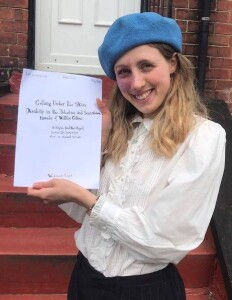Living a Rose-Tinted Life
- Millie Buckingham
- Nov 26, 2020
- 3 min read
Updated: Aug 5, 2021

1st November marked Sturge Weber Syndrome Awareness Day, which marks the rare disease discovered by Dr. William Allen Sturge, born on that date in 1850. Sturge Weber Syndrome affects around 1 in 20-50,000 people. It occurs during early development in the womb, and involves formation of excess blood vessels, which, in the brain, can lead to epilepsy so severe that surgery is required to separate the two halves of the brain – known as a hemispherectomy. This radical procedure involves one side (hemisphere) of the brain being removed or disconnected from the other, to stop or reduce the seizures. Whilst radical, this procedure may be the only answer to life-threatening epileptic seizures – likened to mini-strokes.

I myself was born with a port-wine stain covering the right side of my face, which was identified as ‘Sturge Weber Syndrome’ (SWS) on my early hospital notes. Until I worked at Curious PR, I assumed I didn’t actually have SWS because I don’t suffer from epilepsy or hemiplegia (a stiffness affecting one side of the body). That said, I did have scans to check for these as a baby and teenager. I was found to have glaucoma in my right eye at the age of three, and dyslexia in high school – both symptoms associated with SWS. The condition seems to exist across a spectrum, with the common thread being a facial port-wine stain.

The charity, Sturge Weber UK, is unique in its mission to help those affected – not just medically and professionally, but also on a personal level. Earlier this year, I was delighted to learn that our client, Karen Emanuel, CEO of Key Production, had ‘gifted’ the charity our PR services to publicise the story of two girls with SWS who planned to walk 198 miles (the distance between their homes) during Lockdown. This was despite the fact they both only have half a functioning brain, plus, limited mobility whereby walking for long periods is painful.
Caity Downs, 19, and Angelina Mills, 11 had suffered from seizures that were so dangerous that they both underwent hemispherectomy surgery when they were toddlers, leaving them each with half a brain. – Caity was suffering around 100 episodes a day. Their courage in doing this walk whilst it was documented – all the while smiling and winning the hearts of people looking on – has given me courage. Our team publicised their story, which was covered in detail by The Telegraph, by ITV Meridian, BBC South East and by girls’ local newspapers.
LIFE WITH AN ‘INDELIBLE’ ATTITUDE
At the age of twenty-three, I have now covered up my port wine stain with make-up for just over a decade. Whereas others wear makeup to get noticed, I have worn it as a respite from being noticed, stared at and commented on. My experience of researching port wine stains brings up medical comments or NHS treatments and managements; makeup is suggested as a way to cover up ‘unsightly’ port wine stains, and people like me are often described as ‘sufferers’. To have recently experienced the smiling, capable faces of Caity and Angelina comes as a relief: Differences can be presented in a positive, creative and celebratory light.
The events of June 2020 added to my confidence about the world. The Black Lives Matter protests sparked a zero-tolerance policy to intolerance. If I really think about what I’m afraid of, it is the comments, stares and attitudes of people who are intolerant. So, by wearing makeup, I am appeasing them. My short-term solution of wearing makeup whitewashes the longer-term need for education and understanding in schools and workplaces, so that in society, people with differences are not met with a pathologising stare.
We need more Karens who recognise the importance of sharing stories like Caity and Angelina’s. Courageous people like them need to be lauded. We should stop talking about ‘sufferers’ and start celebrating these individual and extraordinary lives beyond a medical context. When I see such acts of courage, grace and confidence like these, I am inspired to embrace my port wine stain and follow in their lead. Thank you to Caity, Angelina, Karen and everyone at Curious PR, I am truly grateful.


Comments